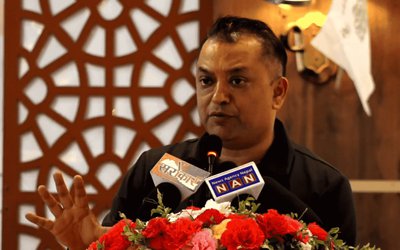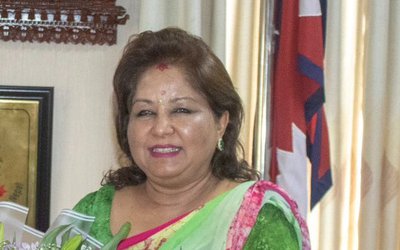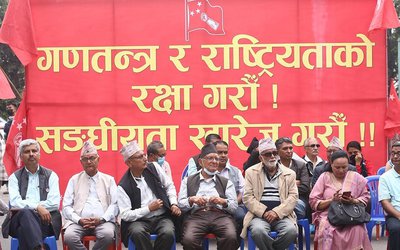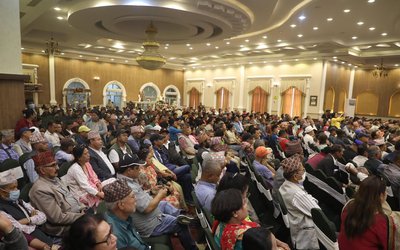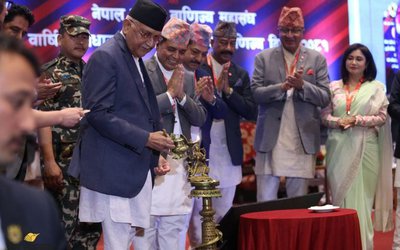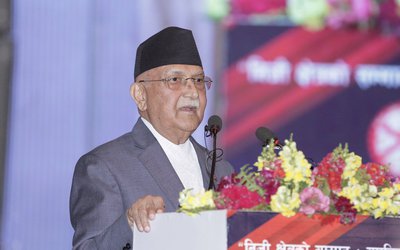
Vice chairman of National Planning Commission Govinda Raj Pokharel and U.S. Ambassador Peter Bodde jointly launched the three USAID Resilience Projects at a USAID Resilience Summit in Kathmandu.
“The Government of Nepal sees resilience as a vital framework to help alleviate poverty and promote more sustainable development, lessening the impacts of disasters. That will take creativity, innovation, and cross-sectoral partnerships, and we are pleased that USAID is highlighting this most important priority,” said Chief Guest vice chair of National Planning Commission Dr. Govinda Pokharel.
Participated by three panelists Jamie McGoldrick, UN Resident Coordinator and UNDP Resident Representative, Puja Panday, Deputy Chief of Party, USAID-funded Suahara Project, Gagan Thapa, CA member and Chair of Agriculture,Natural Resources and Energy Committee of Legislature Parliament and Dr. Beth Dunford, USAID Nepal Mission Director, the summit was moderated by Ashutosh Tiwari, former country representative of WaterAid Nepal.
Speaking at the Summit, U.S. Ambassador Peter Bodde, shared, “Resilience is essential if we are to win the fight against poverty. We know we cannot prevent floods and landslides, but we can work much harder and more strategically to ensure these shocks don’t devastate families or set back hard-won development gains.”
U.S. Summit Highlights New Approaches and Funds up to $70 Million to Build a More Resilient Nepal.
According to a press release issued by Public Affairs Section of Embassy of the United States, the U.S. Agency for International Development (USAID) three new programs with up to $70 million in funds will help communities more quickly recover from natural disasters and other stressors.
USAID Nepal Mission Director Dr. Beth Dunford said disasters are creating more problems all over the world including Nepal and there will be more drastic and intense disaster due to climate change. She said Nepal needs to develop resilience to cope with future disasters.
UN Resident Coordinator Jamie McGoldrick stressed the need to improve the level of preparedness and mitigation activities in the coming days. Donor communities also need to reorient the programs.
CA Member Gagan Thapa said that Nepal's coming challenges will be to prevent the damage and loss from natural disasters. Puja Panday Deputy Chief of Party of USAID funded Suahara project recalled how the disasters affect the nutrition level among the children in disaster affected areas.
The three USAID Resilience Projects include up to $70 million Community Resilience Program integrating disaster risk reduction and climate change adaptation into USAID’s food and nutrition security efforts in Nepal. As quarter of Nepal’s population lives below the international poverty line of $1.25 per day, this program will benefit an estimated 5 million of the most vulnerable in Nepal’s hill regions.
There is also a $500,000 Innovative Early Warning Flooding System. USAID’s Office of Foreign Disaster Assistance will fund an early warning system to help protect communities in the Eastern region from flooding. The project will install gauges along flood-prone rivers and share real-time data with district authorities using SMS and email. This will help save lives in the event of flood.
A $100,000 Science and Technology Competition for Resilience – a call for bold and innovative solutions to “building sustainable food security” in Nepal. The Competition opens on September 4, and will be open to individuals, non-profits, academic institutions, and the private sector, with a focus on districts primarily in the Mid- and Far-West regions of the country.
The number of weather-related disasters has tripled in the last 30 years. The year 2013 was the year with the most disasters. This year’s unprecedented flooding and landslides affecting thousands of Nepalese – already among the most vulnerable – across the country are examples of increasing weather-and climate-change induced disasters.
The Summit brought together government officials and development experts to look for new models to solve complex and interrelated challenges such as extreme poverty, food security, and climate shocks. Working under the leadership of the Government of Nepal, the U.S. Government aims to save and improve more lives, build inclusive economic growth, and decrease the need for humanitarian assistance.
- IME GROUP: Expands Into Paper Industry
- Mar 24, 2025
- CPN UML: Instigated By India
- Mar 23, 2025
- ADB’S CHIEF ECONOMIST: Nepal Reduces Poverty
- Mar 11, 2025
- FM DR. DEUBA: A Successful Visit
- Mar 11, 2025
- MD GHISING: Target Of Personal Grudge
- Mar 09, 2025

